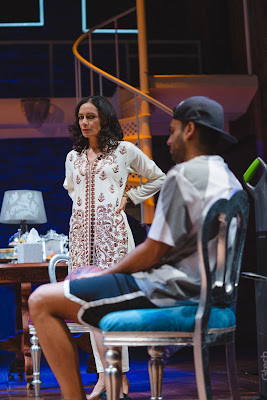Reviewed by James Karas
The play: The
Tragedy of King Richard the Second
Author: William Shakespeare.
Number of characters
in text: 35
Number of characters in
Almeida Theatre production: 12
Number of actors
(who are on stage throughout): 8
Set: A grey box
Props: half a dozen pails with
water, blood and dirt
Playing time: 90
minutes with no intermission.
These are the facts of the production of Richard II directed by Joe
Hill-Gibbins with Simon Russell Beale in the title role at the Almeida Theatre.
They do not disclose the fact that it is an extraordinary production and an
outstanding portrayal of the hapless King Richard by an actor who seems to have
gotten under the skin of the character.
Simon Russell Beale and cast. Photo: Marc Brenner
Beale, dressed in a black t-shirt and black pants with an almost comical
crown on his head, presents Richard in all his fundamental weakness, his
vacuous arrogance and his insipidity.
Richard in his pathetic shallowness believes that he has been appointed king
by God and no human power can remove him from that position.
Beale displays these attitudes and characteristics of Richard without
bombast or pomposity. He is God’s chosen and cannot conceive how anyone can
question his authority.
The inept king and incompetent leader who wears a hollow crown on an
arrogant head is finally defeated by the capable Henry Bolingbroke who becomes
Henry IV. Richard delivers a kind of dirge on his life in his final soliloquy
which is delivered by Beale with incomparable poetic musicality.
Leo Bill as Bolingbroke provides the necessary contrast to Richard. He
is a true leader, decisive, ambitious, efficient and ruthless. He has
everything that Richard lacks including the smarts to show remorse at the death
of the former king even though he wished it.
Joseph Mydell plays Gaunt and delivers
the familiar “this royal throne of kings” speech without sounding like an old
man who is about to die.
Simon Russell Beale and cast. Photo: Marc Brenner
As indicated the actors never leave the stage during the 90-minute
duration of the performance and their presence provides a unified picture of
the production that is engrossing. Outstanding performances from beginning to
end.
The play has been dramaturged by Jeff James and the result with the
eight actors on stage is a seamless and quick transition from one scene to the
next without losing the central plotline or the strength of this outstanding
production.
Hill-Gibbins gives us a Richard II pared down to its essence.
He has drawn out the soul of the play and the results is Shakespeare and
theatre at their best.
__________
Richard II by William Shakespeare continues until February
2, 2019 at the Almeida Theatre, Almeida Street, London, England. https://almeida.co.uk
















